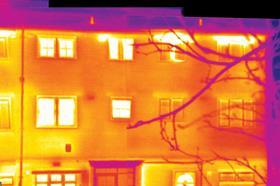Major review by Zero Carbon Hub finds the industry needs cultural revolution to deliver buildings that perform to design

Workers in the construction industry should receive compulsory training in the carbon emissions performance of buildings as part of a range of measures needed to address the gap between how buildings are designed to perform and how they actually behave.
The recommendation is just one of many in a wide-ranging new report from the Zero Carbon Hub into the performance gap which calls for a ‘cultural revolution’ in the industry. It says the system should be enforced by the introduction of a new industry-recognised card scheme, similar to the Construction Skills Certification Scheme which guarantees relevant training.
The Hub’s ‘end of term’ report, for closing the gap between the standards that low carbon homes are designed to and how they perform when built, also recommends an overhaul of the SAP (Standard Assessment Procedure) methodology as part of a framework of measures.
The government-funded report, which concludes an 18-month probe by the Hub, was launched by building regulations minister Stephen Williams today. It undertook a study of 21 sites, covering a variety of building methods, revealing ‘widespread’ shortfalls in the performance of the dwellings, when built, the researchers found.
The report says the causes of the performance gap are systemic and rooted in the industry’s working practices.
The three key contributory factors to the gap are: lack of knowledge and skills; unclear allocation of responsibilities, and inadequate communication.
It says: “A pan-industry shift in focus is required to create the necessary cultural change to address the issues identified.”
The report stops short of recommending fresh government regulation to curb the performance gap. However it proposes that the compliance regime should be strengthened if the industry fails to match by 2020 the hub’s target that the energy efficiency of at least 90% of new homes should be in line with their designs.
Specific recommendations include:
- All new construction industry entrants to undertake energy performance studies, which should be a feature of all built environment courses. Those already working in the industry should attend specific training
- Establish a new, industry-recognised card scheme to demonstrate possession of energy performance knowledge
- Introduce a new building performance and energy awareness qualification
- The government should require energy certified operatives and professionals for all public land developments from 2017
- A review of the SAP methodology and how it is communicated should be undertaken
Housebuilders should produce a signed, plain-English report explaining how a new build home complies with its designed performance once built.
John Slaughter, external affairs director of the Home Builders Federation, welcomed the report’s focus on tackling the issues that holdback poor performance across the board.
However, Wilmott Dixon technical director and Hub founder, David Adams expressed concerns about the Hub’s ‘softly softly’ approach on compliance
He said: “There needs to be a reason for companies to benefit if they do it right and detriment if they choose not to, otherwise we will not do this at scale.”


























2 Readers' comments